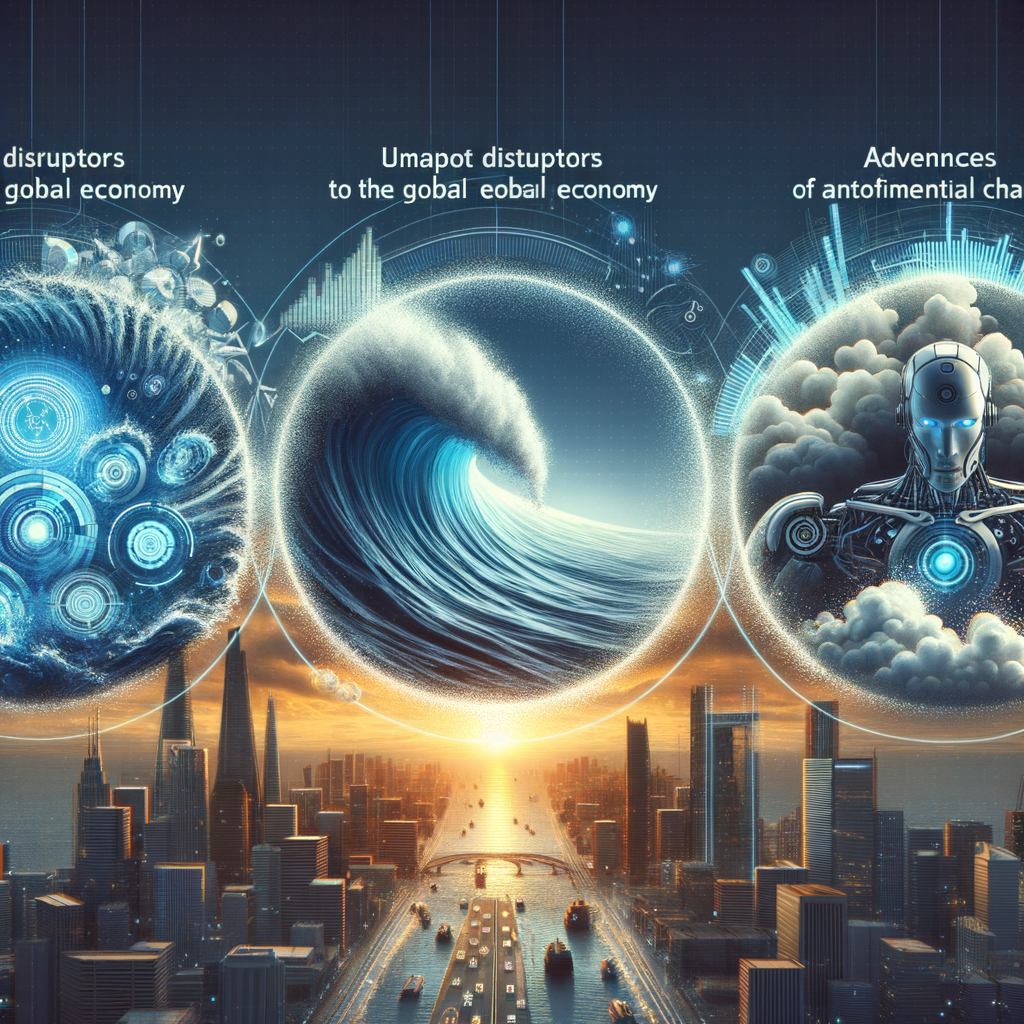Navigating the Future: The Top 3 Global Economic Disruptors in 2024
As the world spins into 2024, the global economy braces for potential disruptors that could reshape markets, redefine international trade, and alter the way we perceive economic stability. Amidst a landscape of rapid technological advancement and shifting geopolitical alliances, three key disruptors stand poised to challenge the status quo, offering both opportunities for growth and cautionary tales for the unprepared.
Firstly, the burgeoning field of artificial intelligence (AI) continues to promise revolutionary changes across industries. AI’s potential to streamline operations, enhance decision-making, and unlock new business models has been widely acknowledged, yet the speed at which it is advancing could catch many by surprise. As AI becomes more sophisticated, it is expected to disrupt labor markets, with automation replacing certain job categories while simultaneously creating new ones. This shift necessitates a rethinking of workforce strategies and education systems to prepare for a future where human-machine collaboration becomes the norm. The optimistic view is that AI will not only increase productivity but also drive economic growth by enabling the creation of innovative products and services.
Secondly, the global economy is increasingly sensitive to the specter of climate change, with its capacity to disrupt through extreme weather events, resource scarcity, and the urgent need for a transition to sustainable practices. In 2024, the economic implications of climate change could become even more pronounced as governments and businesses are compelled to accelerate their green initiatives. The transition to a low-carbon economy presents a unique set of challenges but also opens up a wealth of opportunities in renewable energy, green technology, and sustainable infrastructure. Forward-thinking companies are already positioning themselves to capitalize on this shift, recognizing that sustainability is not just an environmental imperative but also an economic one.
Lastly, the geopolitical landscape is a wildcard that could significantly disrupt global economic dynamics. The rise of economic nationalism and the potential for trade wars can lead to a realignment of global supply chains and trade relationships. As nations grapple with the balance between protecting domestic industries and engaging in free trade, the outcome of these tensions will have far-reaching implications for international commerce. However, this period of transformation also presents a chance for countries to forge new trade agreements and partnerships that better reflect the contemporary economic environment. By embracing a spirit of cooperation and mutual benefit, the global community can navigate these disruptions and emerge with a more resilient and equitable economic framework.
In conclusion, as we navigate the future, it is clear that AI, climate change, and geopolitical shifts are set to be the top three global economic disruptors in 2024. While these forces present significant challenges, they also offer a canvas for innovation and progress. By anticipating these changes and adapting proactively, businesses, governments, and individuals can not only mitigate risks but also harness these disruptors as catalysts for positive transformation. The global economy is on the cusp of a new era, one that requires agility, foresight, and an unwavering commitment to shaping a prosperous and sustainable future for all.
2024’s Economic Landscape: Understanding the 3 Key Disruptors Shaping Our World
As we cast our gaze towards the horizon of 2024, the global economic landscape appears to be at a pivotal juncture, shaped by forces both familiar and novel. Amidst this dynamic backdrop, three key disruptors stand poised to redefine the contours of our world, offering both challenges and opportunities. These potential game-changers—technological advancements, climate change initiatives, and geopolitical shifts—promise to steer the global economy in new directions, with far-reaching implications for nations, industries, and individuals alike.
Firstly, technological advancements continue to accelerate at a breathtaking pace, with the potential to revolutionize industries and labor markets. Artificial intelligence (AI) and automation, in particular, are at the forefront of this transformation. As AI systems become more sophisticated, they are expected to permeate various sectors, from manufacturing to services, enhancing efficiency and productivity. The rise of these technologies could lead to the creation of new industries and job categories, while simultaneously rendering certain skill sets obsolete. However, this disruption is not a harbinger of doom; rather, it presents a unique opportunity for economies to adapt, reskill their workforces, and embrace the potential for innovation-driven growth.
Transitioning seamlessly to the second disruptor, climate change initiatives are gaining unprecedented momentum, as both public and private sectors acknowledge the urgency of addressing environmental concerns. The push towards a greener economy is set to unleash a wave of investments in renewable energy, electric vehicles, and sustainable infrastructure. This green transition not only represents a moral imperative but also a substantial economic opportunity. By fostering the development of eco-friendly technologies and industries, countries can position themselves at the vanguard of a burgeoning market, all while contributing to the global effort to mitigate the impacts of climate change. The optimism here lies in the dual promise of environmental stewardship and economic prosperity, as nations strive to harmonize their growth with the health of the planet.
Lastly, geopolitical shifts are reshaping the global economic order, with emerging markets and developing countries asserting their influence. The reconfiguration of trade alliances and the potential decoupling of major economies could lead to a more multipolar world, where power is more evenly distributed. This shift is likely to engender a more diverse and resilient global economy, as countries diversify their trade partners and supply chains. Moreover, the rise of new economic players provides a fertile ground for cross-border collaboration and innovation, fostering a spirit of global interconnectedness.
In conclusion, as we look ahead to 2024, the global economic landscape is set to be transformed by these three disruptors. Technological advancements promise to redefine the way we work and live, climate change initiatives offer a blueprint for sustainable growth, and geopolitical shifts herald a more balanced global power structure. While these changes may bring uncertainty, they also open doors to new possibilities. By embracing these disruptors, we can chart a course towards a future that is not only prosperous but also equitable and sustainable. The optimism that permeates this outlook is not unfounded; it is rooted in the belief that, through innovation and collaboration, we can turn potential disruptions into powerful engines of progress.







